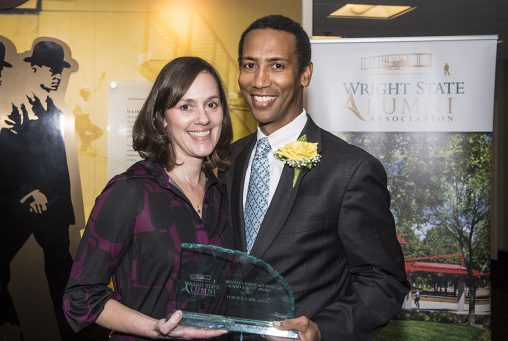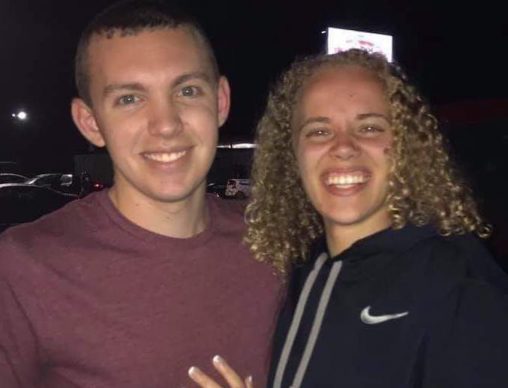
Lisa and Vercie Lark at Wright State in 2014, when Vercie was honored with the Distinguished Alumni Achievement Award from the Wright State Alumni Association.
While they may not have known each other growing up, Vercie and Lisa Lark came from similar backgrounds. They were both raised in large families in Dayton and their parents instilled in them the importance of working hard and graduating from high school.
For Vercie’s parents, the path forward was clear. Education was the instrument that all seven of the Lark children could utilize to navigate their way to a brighter future.
“My father and mother always focused on us getting a good education,” said Vercie, an electrical engineering graduate of Wright State. “It was all about how do we improve our lives.”
After graduating from Wilbur Wright High School, Vercie enrolled at Central State University. A scholarship from the Hobart Corporation helped pay for his tuition. Two years later, Vercie transferred to Wright State University.
When Vercie enrolled at Wright State in the mid-1980s, the university had only a small population of minority students. Vercie had found himself in a similar situation when he was bused to Wilbur Wright High School.
“I was a little bit fearful, to be candid,” he recalled.
But on his first day at Wright State, Vercie saw some familiar faces from his days at Wilbur Wright High School. “My fear factor went down immediately. I felt very welcome,” he said.
Vercie’s professors also helped ease his transition to Wright State. “They immediately reached out to me,” he said.
Several faculty members invited Vercie to their offices to talk, which also broke the ice. One of his professors told him, “If you have issues, I’m here for you.”
When Vercie turned in his senior electrical engineering project, his professor acknowledged that he had done good work but it wasn’t yet worthy of an A. The professor gave Vercie another week to work on the project so he could raise his grade. Vercie ended up getting an A.
“That doesn’t happen at all schools,” said Vercie. “He reached out to me. There were a lot of people at Wright State that wanted to help me.”
While attending Wright State, Vercie began working part time as a laborer at Monsanto Research Corporation in Miamisburg, where he assisted with yardwork and grounds maintenance. By his senior year, he was employed as an electrical technician at Monsanto. He was hired full time after he graduated from Wright State in 1986 with a bachelor’s degree in electrical engineering.
Vercie’s future wife, Lisa Hammond, had navigated a different path in life. In the Hammond household, there was no push to go to college. The six Hammond children were encouraged to focus on getting good jobs.
During her last two years at Meadowdale High School, Hammond took classes at the Dayton Career Academy, where she developed valuable skills for the workplace. As a high school senior, she began working at the Montgomery County Common Pleas Court. She was hired on full time after her high school graduation.
While Lisa took a few classes at Sinclair Community College, she never pursued a bachelor’s degree. Looking back, she wishes she had received more encouragement to go to college.
“I was a pretty shy kid. I wasn’t going to go out of my way to get help in high school and talk to counselors to even learn about college. I didn’t even know there were scholarships when I was high school,” she said. “I hope that in schools nowadays kids are more connected with their counselors and they know them personally. I hope that kids know that there are all of these scholarships out there.”
Vercie stayed at Monsanto for two years, where he worked on computer-aided systems in the engineering department. Before his departure, he had moved out of engineering into information technology.
By the time Vercie relocated to Houston to join Compaq Computer Corporation and Hewlett Packard, he had met Lisa in a church parking lot. The couple married in 1991. After their move to Houston, Lisa worked for the federal public defender’s office. She became a stay-at-home mom after their first child was born in 1994.
During his 16 years in Houston, Vercie advanced into a number of supervisory and managerial roles. By the time he left, he was a senior director. Vercie’s next move took the Larks to Kansas City, where he joined Sprint Nextel. That company spun off Embarq, where Vercie became chief information officer.
Vercie eventually moved on to DST Systems as its chief information officer. He later served as head of DST Financial Services, which provides technology and outsourcing to brokerage, asset management, retirement firms and the like. He retired from DST Financial Services in 2018 after it was acquired by SS&C.
Vercie enjoyed all of the changes that his broad career provided. From engineering to IT to running the financial services business, he loved the opportunity to take on new challenges.
“I like learning new things. My brain never stops. I’ve never said ‘no’ to any job opportunity that was presented to me,” he said. “And it all started with an engineering degree that I got from Wright State.”
Following his retirement, Vercie published “Make It Rain: Increase Your Wealth and Financial Security,” a guidebook to help people start investing regardless of their age and income. Lisa edited the book and advised Vercie to keep his tips simple, practical and easy to follow.
“The book is simply geared toward helping people who don’t have access to financial advisors or other people that can help them with their money. That’s the majority of Americans,” said Vercie. “It’s just another way to give back and help hardworking folks improve their financial lives.”
Making a difference
For the last 15 years, the Larks have donated both their time and treasure to help people in their community.
“When I came to Kansas, I got really immersed in a lot of the community activities going on around here through the Kansas City Chamber’s Centurion leadership program,” said Vercie. “That opened my eyes to a lot of need.”
Lisa has volunteered with Downtown Outreach, a nonprofit organization in Kansas City that provides hunger relief. Before the COVID-19 pandemic, she would help cook and serve lunch in a downtown church on Saturdays.
The couple also began thinking about Dayton and how they could help people in their hometown. They partnered with Eric Bradley and Chuck Taylor, two high school friends who founded the Dayton Varsity Club, to provide college scholarships to students in the Dayton Public School system, and then they turned their attention to Wright State.
In December 2017, the Hammond and Lark Family Fund was established at Wright State to reward and recognize promising students, with financial need, in the College of Engineering and Computer Science.
“It would be our way of leaving a legacy at Wright State under our family name to honor our families who played an important role in us achieving our own dreams,” Vercie said. “It was also about providing some money to kids who are falling through the gap. We’ve seen kids drop out because they don’t have the money and can’t afford to stay.”
The Larks especially wanted to help a group of students that don’t normally receive assistance. With high-achieving students often earning scholarships based on their academic merit and lower-income students frequently helped by grants, the couple directed their gift to assist those students who are caught in the middle — the gap — and can easily get overlooked when it comes to needing money for college.
“Those in the middle are the ones who really struggle financially,” said Vercie. “They may be working one or more jobs while going to college or they may simply need some additional money to stay in college.”
For Lisa, the Hammond and Lark Family Fund is all about helping people invest in themselves. “Your life can change by getting a scholarship to go to college,” she said. “You can better yourself and invest in your future.”

Newlyweds Kyle and Hanah Turner are grateful for the support they have received from the Lark family as they begin their married life.
Kyle Turner is one of the first recipients of the Hammond and Lark Family Fund, which has given Kyle Turner a great start in life.
“This is really helping my life,” said Turner, who is pursuing a master’s degree in materials engineering.
Turner knows all too well the importance of scholarships. When he enrolled at Wright State as an undergraduate, he received the Valedictorian Scholarship, which covered his tuition and allowed him to graduate debt free.
“Scholarships help a lot,” said Turner. “Every single penny counts.”
Since June 2019, Turner has interned at Wright-Patterson Air Force Base, where he is conducting research on improving the quality of ceramic composites so they can withstand high temperatures. He hopes to remain in the Dayton area after graduation and eventually pursue his Ph.D.
In August 2020, he married his high school sweetheart, Hanah. The Turners are grateful for the support they have received from the Lark family as they begin their married life.
“Their gift has really touched us,” said Turner. “What they’re doing is making a difference. Their gift is going to good use, and we really appreciate it.”
As someone who did not have the opportunity to go to college, Lisa is grateful that she and Vercie can help Wright State students launch successful careers.
“When I think about working now that my kids are grown, there are lots of things that I would like to do but I can’t do, because I don’t have a college degree,” said Lisa. “Donors can make a difference in somebody’s life and influence which path they go down. They could impact somebody’s life in a way that they would never even know. It’s just a great thing.”
“You just don’t know how a person is going to turn out. Even a small investment goes a long way,” said Vercie, who encourages other Wright State alumni to support student scholarships.
“You don’t have to wait until you’re rich to make a difference. You can do it at any time in your life if you’re willing to give. Give a little. If you do that every year, it adds up,” he said. “The most rewarding thing Lisa and I do now is we just simply find ways to help others.”

 Wright State psychology team studies ways to identify fatigue in pilots, drivers
Wright State psychology team studies ways to identify fatigue in pilots, drivers  Wright State videographer Kris Sproles wins Regional Emmy and Ohio journalism award
Wright State videographer Kris Sproles wins Regional Emmy and Ohio journalism award  Wright State Boonshoft School of Medicine ranked among the nation’s best for 2024 by U.S. News
Wright State Boonshoft School of Medicine ranked among the nation’s best for 2024 by U.S. News  Exposing biotechnology
Exposing biotechnology  Wright State faculty member Dan Noel uses unique background to inspire new leaders
Wright State faculty member Dan Noel uses unique background to inspire new leaders 